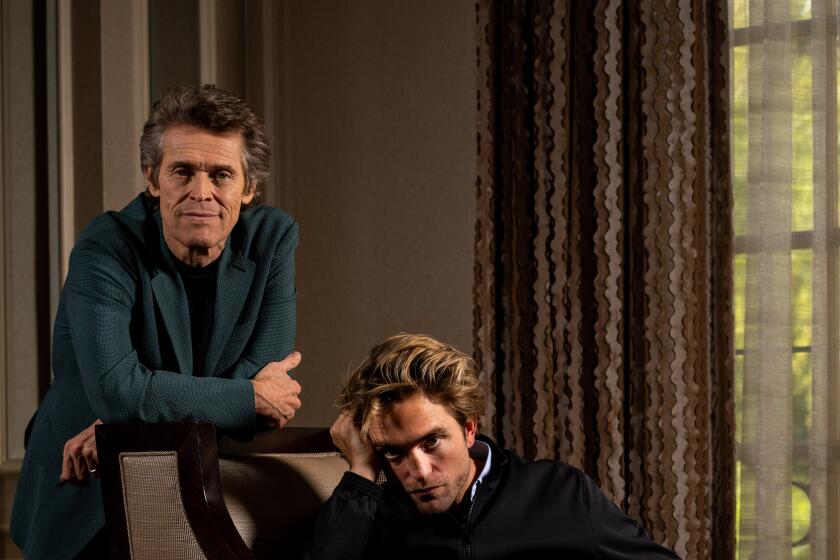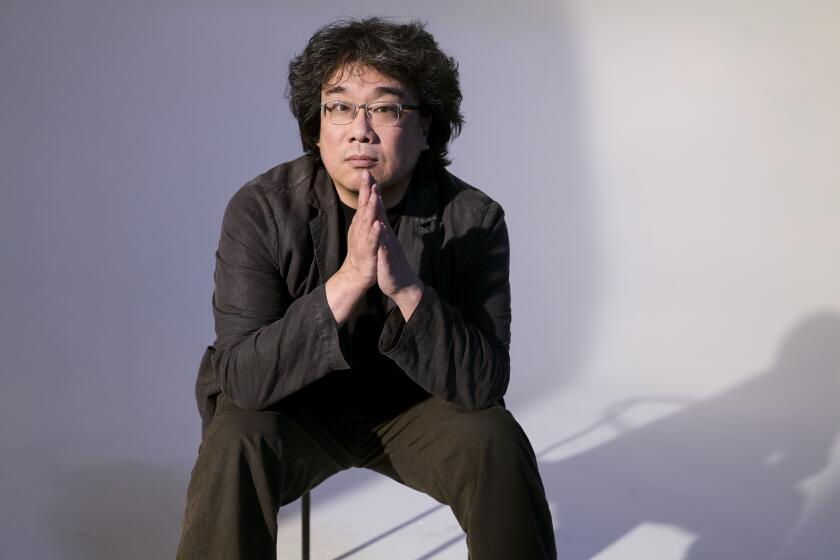Surrender to the charming self-deprecation of Robert Pattinson

- Share via
When other people were out celebrating the New Year, Robert Pattinson was staring at an empty calendar, thinking, “God. Nothing. My career is over. I need to quit. I need to start finding work in other industries.” Music? Maybe. Japanese toilet spokesperson? Why not? His public love for them has made many converts.
Within months though, Pattinson had landed two huge roles, first in Christopher Nolan’s 2020 globe-trotting action-thriller “Tenet” and then the lead role in Matt Reeves’ “The Batman,” set for 2021. His professional anxieties eased, Pattinson soon found another thing to worry about.
“I immediately thought, ‘Oh God, does that mean I’m going to get a really bad disease?’” Pattinson says, laughing. “I just had a really weird feeling about it. I’m always scared of blowing all my luck, and getting both those jobs, one right after the other ...”
He finishes the thought with an analogy that can’t be printed here but is quite funny and modest and brings to mind Willem Dafoe looking at me recently and saying of Pattinson, with no small amount of exasperation: How do I deal with this charming self-deprecation?
Dafoe’s question was less an inquiry and more of an act of surrender to Pattinson. For the last month, they had been going around together, doing countless Q&As in support of their movie, “The Lighthouse,” Robert Eggers’ claustrophobic chamber piece about a couple of lighthouse keepers trying to keep madness at bay while at a remote island station.
Sex dreams about mermaids, ill-tempered seagulls who seem possessed, flatulence employed as “deliberate displays of power.” Robert Eggers’ black-and-white thriller “The Lighthouse” has much to discuss.
At these events, Dafoe typically drives the conversation, much as his character does in the movie, though without the old-timey sea captain manner of speaking. He’ll talk about craft, preparation, rhythms of language, the sense of discovery that makes acting come alive.
Then Pattinson will puncture the whole thing with an offhand observation about feeling like he’s a lumbering dolt capable of delivering only one emotion at a time, squeezing it out the way a large, flightless bird might produce an egg under the hard duress of labor.
And Dafoe will just throw up his hands because if you’ve seen any of Pattinson’s work, primarily in this recent, remarkable run of indie movies made with the likes of David Cronenberg, Claire Denis, the Safdie brothers and David Michôd, you know that he possesses actual, discernible gifts. On screen, Pattinson can convey self-mockery, vulnerability, intensity and insanity. In “The Lighthouse,” he often veers between these emotions in the same scene.
But ask Pattinson about any of this and he will cover his face with his hands and begin to massage those exquisite angular features that pop with such beauty in the dramatic, black and white photography of “The Lighthouse” and just laugh. Pattinson finds just about everything about life ridiculous, but any discussion of acting will steer him toward hysterics.
“I’ve always been fascinated by someone who tells me, ‘I like your choices in that scene,’ because I don’t even know what the options are,” Pattinson says, giggling. “I feel like you have a thick membrane of consciousness and you’re digging inside yourself, trying to find one little idea and hope it works. It’s an all-consuming terror and it has been there from the start. I have no idea what I’m doing. I’m just tossing a coin, relying entirely on luck.”
And, yes, this is ridiculous, and Pattinson, 33, knows that full well. But in recalling his transition from playing the vampire romantic Edward Cullen in the “Twilight” franchise to making strange, art house movies that people might stumble across at 2 in the morning and think, “What in the name of God is going on here?,” Pattinson can peg the pivotal moment.
“It’s when David [Cronenberg] called me for ‘Cosmopolis,’” Pattinson says, referring to the 2012 movie in which he played a Wall Street titan crawling across Manhattan in a limo. Before that, all his auditions were for mainstream movies. “I didn’t know you could go after the people you wanted to work with. And that’s what I’ve done the last eight movies.”
That includes “The Batman.” Pattinson read about Reeves making a noir “Batman” movie and thought, “I haven’t done a big thing for ages. This is the one I want.” (His agents were shocked.) He badgered Reeves, met with him and producer Dylan Clark a number of times and finally secured an audition. He spent three weeks preparing for his audition scene only to have all his work cast aside once he put on the Batsuit.
The lesson I always learn is don’t ever bother preparing for anything because it’s pointless.
— Robert Pattinson
“The lesson I always learn is don’t ever bother preparing for anything because it’s pointless,” Pattinson says. “Every time I’ve heavily prepared a scene, I go in and they’ll say something like, ‘Oh, by the way, it’s zero gravity.’ Or: ‘It’s raining.’” And I’m like, ‘But I really wanted to play it this way! I’ve been thinking about it every waking minute!’ It never works!”
Again, Pattinson finds all this extremely amusing and so you do too because it’s impossible not to get caught up in his casual, good-natured and clear-eyed view of acting and stardom. Two years ago for a magazine cover profile, he was asked to do a video in which he’d interview his hair. He was furious. Now he’d probably do it. But at the time, it seemed too obvious.
“And I never want to do something for an audience ... ever,” Pattinson says. “I think it’s literally disgusting.” He bursts out laughing at the force of his disdain.

“It’s just so disrespectful of people. ‘I made this for you,’ he continues, on a roll. “You don’t know me. How can you know what I want? And it also indoctrinates the audience into thinking that they somehow are special because someone said, ‘I made it for you.’ They didn’t make it for you. They made it for your money.
“Everybody should be making [things] for themselves. If no one likes it, you just have to do it more. And put it out more places. And eventually someone will like it. It has to work eventually. I call it the [Charles] Bukowski method.”
Pattinson has been practicing that method for several years and, threat of a fatal disease notwithstanding, it has paid off. Antonio Banderas recently approached him to tell him he had just randomly streamed Denis’ trippy, cosmic puzzle picture “High Life,” which prompted Pattinson to laugh, yes, at the randomness of finding that movie on a streaming service and then to remember all those movies he had picked up at secondhand DVD stores, movies he bought for their covers, five for $20.
“I loved that nerdy thing if you went to Amoeba and you impressed someone at the counter with what you chose to buy,” Pattinson says. “I would stay there for hours trying to find stuff. I miss that.”
Pattinson now gets his approval — and DVDs — elsewhere. (“I don’t even have a DVD player. It’s depressing. The only DVDs I have are multiregion for really obscure stuff. I order them from Greece. I’m pretty sure they’re illegal.”) He does seem to enjoy the interview process more than he did just a couple of years ago, and he’s definitely having more fun than he did in the days when Lionsgate executives forced him to take media training so he wouldn’t say ridiculous things during junket interviews promoting “Twilight.”
“The early ‘Twilight’ stuff, it was all a little bit thrilling to see how far you could push it,” Pattinson remembers, laughing. “If you say something with an English accent and a smile on your face, you can literally get away with tons. Of course, my blood was like 90% caffeine from all the Coca-Colas I drank because I’d been out all night.”
“So, yes, they tried to teach me the value of talking points,” he continues. “‘Stick to the points.’ And maybe that does work. I see all these other actors doing it. But I can’t ever remember the talking points. I can barely remember my lines! I’m not going to sit at home and try to remember my interview lines.”
More to Read
Only good movies
Get the Indie Focus newsletter, Mark Olsen's weekly guide to the world of cinema.
You may occasionally receive promotional content from the Los Angeles Times.












